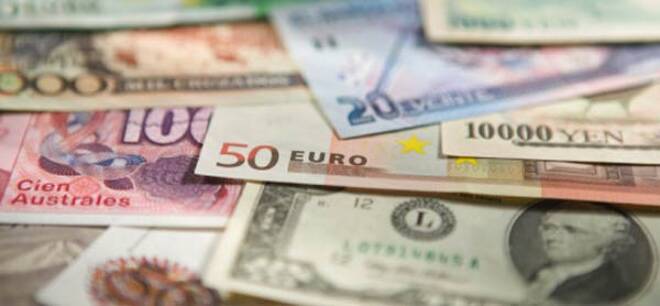Advertisement
Advertisement
EUR/USD Price Analysis for December 7, 2017
By:
Euro Drops as Momentum Turns Negative
The EUR/USD moved lower continuing to form a top as the dollar gained traction following despite a softer than expected U.S. private payroll report. German manufacturing was stronger than expected while the ECB Mersch discussed the risks of QE toward inflation. The Eurozone retail PMI rose, but the German construction PMI declined.
Technicals
The EUR/USD moved lower after falling through support near the 10-day moving average on Tuesday which is now seen as resistance at 1.1866. Support is seen near an upward sloping trend line that comes in near 1.17. Momentum has turned negative as the MACD (moving average convergence divergence) index generated a crossover sell signal. This occurs as the MACD line (the 12-day moving average minus the 26-day moving average) crosses below the MACD signal line (the 9-day moving average of the MACD line). The RSI (relative strength index) moved lower with price action reflecting accelerating negative momentum.
German manufacturing orders unexpectedly rose 0.5% month over month in October
German manufacturing orders unexpectedly rose 0.5% month over month in October. Expectations had been for a correction from the strong September number, but while the last figure was revised up to 1.2% month over month from 1.0% month over month, the October number showed a further improvement of 0.5% month over month. This confirms firm survey data and expectations for another strong GDP growth rate in Q4. The German, but also the overall Eurozone industrial sector continues to fire on all cylinders with job creation accelerating, but price pressures also emerging now. Against that background Draghi could tweak the forward guidance next week somewhat to clarify that in the central scenario net asset purchases will end in September next year, even if the door to another follow on program remains theoretically open.
ECB’s Mersch sees trend reversal in wages and inflation
The Executive Board member said “wages as well as underlying inflation seem to have made a trend reversal” and suggested that there is a risk of keeping monetary policy too accommodative for too long. “If our forward guidance is reaching too far into the future, beyond the point at which reasonable predictions about the economy can be made, there is a risk that our hands will be tied needlessly”. Mersch conceded that “if stimulus if removed too quickly too soon, the economy may suffer”, but added that “at the same time risks increase the longer QE runs”, stressing that “to contain those risks a credible perspective of an exit is needed”.
U.S. ADP Reported an Increase in Private Payrolls
U.S. ADP reported private payrolls increased 190k in November after the 235k jump in October. Estimates were for a 250K increase. The goods sector added 36 jobs, including a 40k climb in manufacturing and a 4k drop in construction following the big jump in October on hurricane effects. The service sector added 155k. Trade, transportation employment was up 36k. Leisure/hospitality jobs increased 25k.
Eurozone Retail PMI Rose in November
Eurozone retail PMI rose to 52.4 in November, from 51.1 in October, with indices rising in Germany and France, while in Italy the PMI fell back below the 50 point no change mark in November. Usually not a market moving indicator, but the overall improvement ties in with rising employment growth and positive survey indicators, confirming that the Eurozone recovery continues to strengthen.
Swedish Riksbank Questions Bond Purchases
Swedish Riksbank’s Ohlsson questions need to extend bond purchases. Riksbank Deputy Governor Ohlsson said that while the bank could extend bond purchases further, he questions whether this would be desirable given that inflation during 207 has been “very satisfactory”, adding that he plans to make a decision on any potential extension of bond purchases a few days ahead of the policy meeting on December 19. The last QE extension was already controversial and Ohlsson is sitting in the hawkish camp.
German Construction PMI Feel Back
German construction PMI fell back to 53.1 in November from 53.3 in the previous month. The index still points to a healthy rate of expansion amid concerns that German property prices in cities and urban areas are overvalued.
Swiss CPI Increased
Swiss November CPI lifted to 0.8% year over year to the highest rate since March 2011, rising from 0.7% year over year October. The rise matched the median forecast. The 6%-odd depreciation in the franc between October 2016 and October 2017 has lifted import prices and rekindled inflationary pressures in Switzerland’s economy.
About the Author
David Beckerauthor
David Becker focuses his attention on various consulting and portfolio management activities at Fortuity LLC, where he currently provides oversight for a multimillion-dollar portfolio consisting of commodities, debt, equities, real estate, and more.
Advertisement
